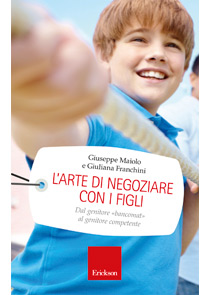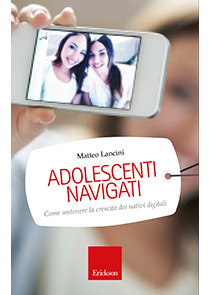 EN
EN
 PT
PT

From strategies for negotiating with your children and advice on how to best handle an “extended” family to suggestions for talking to your children about emotions, social networks and sex: here is a selection of books designed to help parents build a harmonious relationship with their children.
Being a parent is a difficult and complex task, even though it is not without its rewards. However, mum and dad often feel inadequate and doubtful about how to face the changes their children go through or those rites of passage that mark different phases of growth.
Aren’t they spending too much time on Facebook? Should they be coming back after midnight at their age? And what if that classmate of theirs who they say they do homework with every afternoon is more than a friend?
If until some time ago the policy of «no’s that help children grow up» was a saviour for parents, today, many parents, pushed by the desire to know how to best behave with their children, continuously question their educational role, by reading columns in newspapers and magazines or entire websites dedicated to parents looking for advice and help on how to bring up children and adolescents.
To satisfy these needs, here is a selection of Erickson’s latest editorial releases designed to help parents build a harmonious relationship with their children and consciously tackle the problems they encounter.
 THE ART OF NEGOTIATING WITH YOUR CHILDREN
THE ART OF NEGOTIATING WITH YOUR CHILDREN
by Giuseppe Maiolo and Giuliana Franchini
In relationships with your children, no matter what the age, as well as authority and educational coherence, it is essential that you know the rules of negotiating, in order to help them grow and also to reduce conflicts between you, the parents, and your children.
This book is designed as a practical aid for those problematic situations where negotiation can be used as an educational tool and can help improve relations with your children. Knowing how to negotiate with your children does not mean waiving the right to set rules and limits, instead it means developing good relationships, starting from the ability to find solutions together and identify shared objectives.
Starting with a few short stories of every-day conflict, the book provides practical tips and strategies for learning the techniques of negotiation, offering interpretations of conflicts and possible methods of constructive interaction between parents and children.
 EXTENDED FAMILIES
EXTENDED FAMILIES
by Laura Pettenò and Roberta Mariotti
When the bond in a couple breaks, following a separation, divorce or due to unexpected events, like the death or one of the two, the family unit can transform, giving life to a new couple, or to blended or extended families. And if one or both the partners already have children, you need to plan not only how to behave with your new partner but also with their children, your own children, with the relative natural parents and with any children which may come about from the new union.
Whether dealing with stable cohabitation or planning for holidays or weekends, it is essential that the building of a blended family be tackled confidently and in harmony and that everyone is aware of their educational roles and responsibilities.
The result of a lengthy experience as psychotherapists, the authors provide guidelines and practical tips to all those who find themselves taking care of or bringing up children who are not their own, children from previous partnerships, children who are adopted or fostered, temporarily or permanently. Thanks also to the accounts and true stories it contains, the book analyses the obstacles which compromise the building of a peaceful coexistence and the strategies which parents can enact in order to face change, distribute responsibility, facilitate integration and start a new life adventure.
 WORLD (WEB) WISE ADOLESCENTS
WORLD (WEB) WISE ADOLESCENTS
by Matteo Lancini
How to support digital natives in growing up
They live immersed in the web, they use social networks during school too and they communicate with each other on WhatsApp. They are the digital natives, now adolescents, who hide behind computer screens and are always online, avoiding contact with the real world or using the web to put themselves on show.
This intensive use of the Internet together with the sharp rise in virtual relations almost always leaves adults bewildered and unprepared to face the challenge of bringing up their children.
Using the web and social networks to put yourself on show are two different ways that narcistically fragile adolescents can choose to adopt in order to deal with their sense of inadequacy. Some face their fears by adopting uninhibited and reckless behaviour, they publish anything and everything to do with themselves online, in the hope of receiving enough «likes». Others, however, feel embarrassed and withdraw from the social scene because they are afraid of being hopelessly ugly or undesirable.
World (web) wise adolescents, which came out of the long-standing experience the author has had as a psychotherapist for adolescents and their families, offers, by way of examples and extremely practical tips, authoritative and effective educational strategies for responding to the developmental needs of digital natives.
 LANGUAGE OF THE HEART
LANGUAGE OF THE HEART
by Claudia Perdighe
Every parent wants the best for their child and wants to be the perfect mum or perfect dad. It may seem trivial and clichéd, but in day-to-day life — where children cry, get angry, scream like banshees and want things that are contrary to survival — things get complicated… and instead of relishing in the wonderful adventure of being a parent, we tend to see every reaction the child has as a constant test of our abilities.
Language of the heart, which is inspired by cognitive behavioural psychotherapy and especially Acceptance and Commitment Therapy, is a valuable manual with instructions, advice, suggestions and strategies to help mum, dad, grandparents and educators to:
• Bring up children without protecting them from their emotions, not even painful ones, thus teaching them to put up with the normal frustrations and difficulties life throws at them
• Listen to their feelings, without repressing, inhibiting or blocking them
• Accept their experiences and not try to «sterilise» them like you do with a baby’s bottle to keep germs away.